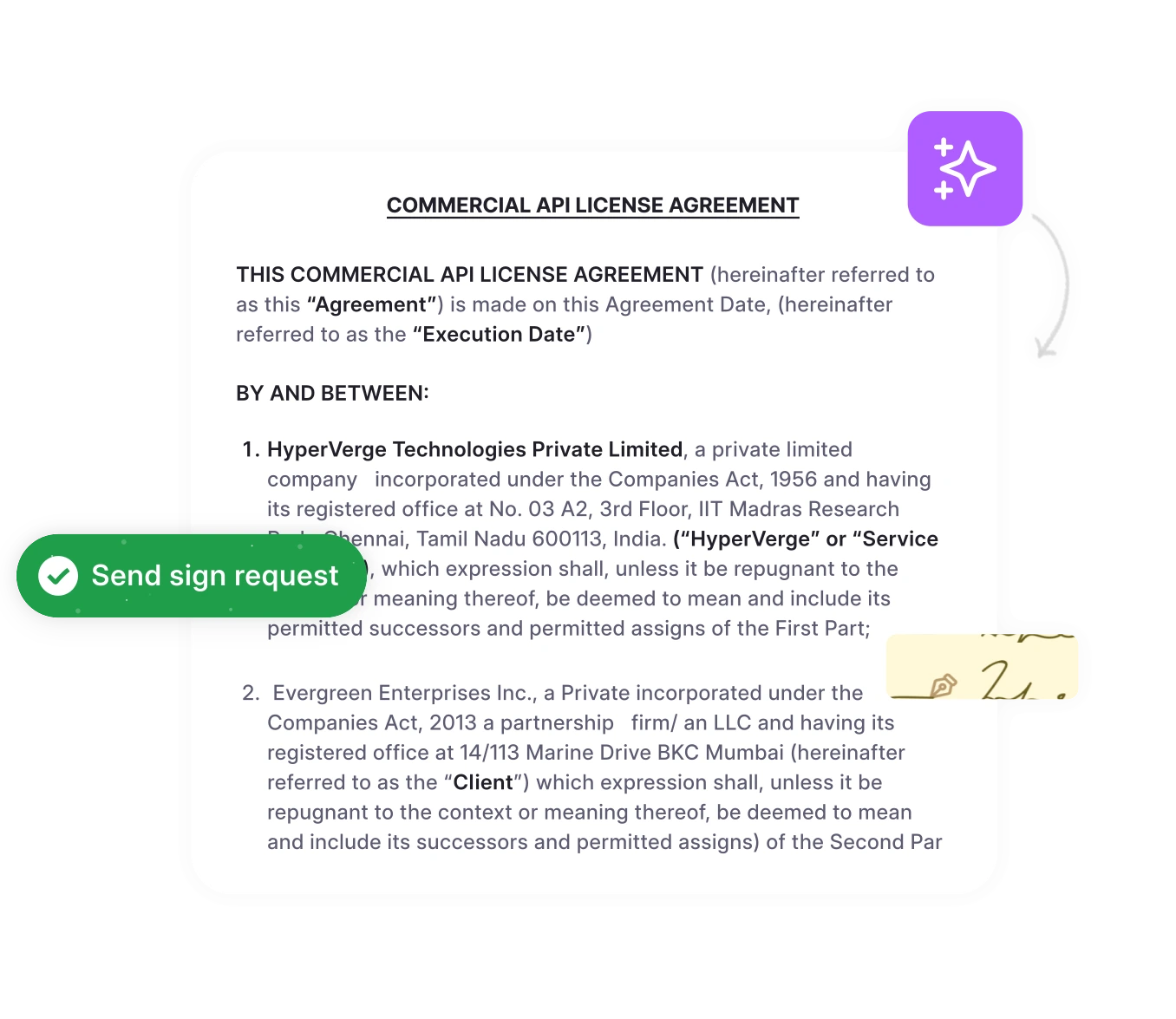A contract is a legal document made up of different components. These components come together to form an enforceable agreement with legal recognition.
The six fundamental elements of a contract are:
- Contractual offer
- Contract acceptance
- Stakeholder awareness
- Contractual consideration
- Contractual capacity
- Contract legality
Missing out on even one of these elements reduces the contract’s validity. Therefore, it is critical to ensure all contracts contain all these elements and components.
This blog provides detailed information on each contract element—its basics, importance, and considerations. This will help you create compliant, legally sound contracts. Let’s get started and understand each element.
1. Contractual offer
Offer is the starting point of a contract. A contractual offer refers to a proposal from one party (the offeror) to another (the offeree). It indicates a willingness to agree.
This offer should clearly outline the obligations, conditions, and expectations involved in the deal. A well-drafted offer minimizes ambiguity, leaving no room for misinterpretation between stakeholders, and reflects the offeror’s genuine intent to form a legal relationship.
An offer can be made verbally, in writing, or even through conduct. Unlike casual contract negotiations, an offer sets the stage for an enforceable contract when accepted without modifications.
It’s important to distinguish between an offer and an invitation to treat, which is a preliminary communication inviting others to make offers. An invitation to treat does not constitute a binding offer but rather invites potential parties to negotiate terms.
Factors to consider in contractual offer
Clarity of Terms: Clearly define key details such as the subject matter, price, deadlines, and obligations to avoid future disputes.
Legal Intent: Ensure the offer indicates an intention to establish a legally binding agreement, not just a casual discussion.
Definiteness: The terms should be specific, with no essential detail left vague or open-ended.
Duration of Offer: Specify how long the offer remains valid to prevent uncertainty.
Fairness: Avoid terms that impose unfair or oppressive obligations, which could make the contract unenforceable in court.
2. Contract acceptance
Contractual acceptance is when the offeree agrees to the terms mentioned in the offer, transforming it into a binding legal document. Contract acceptance must be clear, unconditional, and communicated effectively to the offeror. It reflects mutual agreement, meaning both parties fully understand and consent to the contract’s terms.
Acceptance can occur in various forms: verbally, in writing, or through conduct. A few ways to indicate contract acceptance are signing a contract, sending a confirmation email, or performing the requested service.
Additionally, contract acceptance must align with the original offer without any alterations. Any changes to the offer would be considered a counteroffer, not acceptance.
Key aspects of contract acceptance
Clarity: Acceptance should be straightforward, leaving no scope for considerations or negotiations.
Communication of Acceptance: Ensure the acceptance is communicated to the offeror through a mutually agreed method (e.g., email, signature, verbal confirmation).
Conditional Acceptance: Be cautious with acceptance that includes conditions—it’s often considered a counteroffer rather than acceptance.
Timelines: Acceptance should occur within the timeframe specified in the offer. If no deadline is mentioned, it should be within a reasonable period.
Legal Capacity: The person accepting the offer must have the legal capacity to do so (e.g., of legal age, mentally competent).
Eliminate contract risks with smart compliance
HyperStart CLM helps you verify essential contract elements, reducing risks and ensuring enforceability.
3. Stakeholder awareness
Stakeholder awareness refers to the level of understanding and clarity all involved parties have regarding a contract’s terms, obligations, and potential risks. This awareness ensures that everyone involved in the contract knows their roles, responsibilities, and the contract’s legal impact.
Inadequate stakeholder awareness leads to misunderstandings, disputes, breaches, and unenforceable agreements. In business, stakeholder awareness promotes transparency, accountability, and stronger professional relationships, minimizing the chances of conflicts.
Awareness is especially essential in contracts involving multiple stakeholders, such as corporate agreements, partnerships, or joint ventures, where clarity is necessary to align all parties’ expectations and responsibilities.
Key considerations for stakeholder awareness
Clear Communication: Present contract terms in simple, understandable language, avoiding legal jargon when unnecessary.
Comprehensive Understanding: Ensure stakeholders fully grasp their obligations, rights, and potential risks tied to the contract.
Informed Consent: Get written confirmation that stakeholders have read, understood, and agreed to the contract terms.
Transparency: Maintain openness about contract changes, updates, or clauses that may impact the stakeholders.
4. Contractual consideration
Contractual consideration refers to the value exchanged between two or more parties, which makes a contract legally enforceable. This value can be in the form of money, goods, services, or even a promise to perform (or refrain from) a particular action.
Consideration does not have to be monetary. It simply needs to be something of value to the parties involved. By considering a contract, stakeholders indicate mutual agreement, where both parties benefit in some way from the agreement. Without consideration, a contract may be deemed unenforceable.
For example, in a service agreement, a freelancer may agree to complete a project, such as designing a website or writing content, and in return, the client promises to compensate the freelancer with a fee.
Core aspects of contractual consideration
Mutual Exchange: Both parties must exchange something of value, creating a balanced relationship.
Legality: The consideration must involve lawful activities; agreements based on illegal acts are void.
Sufficiency: The consideration should have measurable value.
5. Contractual capacity
Contractual capacity refers to the legal ability of parties to enter into a binding agreement. This capacity requires individuals to be of legal age, mentally competent, and free from influence. A contract signed by someone lacking capacity can be void or voidable, depending on the circumstances.
Capacity ensures that parties fully understand the contract’s terms and implications. For businesses, contractual capacity may also involve verifying that the individual signing the contract is authorized to represent the company legally.
Considerations for contractual capacity
Age and Competence: Confirm that parties meet the legal age requirement and possess the mental competence to understand the contract.
Freedom from Influence: Ensure decisions are made voluntarily without external pressure or manipulation.
Legal Standing: Verify that no legal restrictions (such as bankruptcy or guardianship) prevent the party from contracting.
Proof of Capacity: Maintain records to support the legal capacity of all parties involved in the agreement.
6. Contract legality
Contract legality ensures that the contract’s subject matter, terms, and execution comply with applicable laws and do not violate public policy. A contract that involves illegal activities, fraudulent practices, or terms contrary to public welfare is unenforceable in a court of law.
Contracts must serve a lawful purpose, and courts can declare contracts that are illegal, unethical, or harmful to the public interest void. Even if all other elements are present, the absence of legality means that the contract is null and void.
Factors to consider for contract legality
Compliance with Laws: Ensure the contract adheres to federal, state, and local regulations and contract law.
Public Policy: Avoid clauses that contradict public interest or promote unlawful activities.
Review of Terms: Regularly review contract clauses to ensure they comply with evolving legal standards.
Judicial Oversight: Courts may assess the contract’s enforceability if disputes arise.
Create legally binding contracts with ease
HyperStart CLM offers AI drafting assistance to ensure compliant, enforceable contracts.
Struggling to create compliant, secure contracts?
Using contract management software can help you create compliant, legally sound contracts. AI-based drafting and review assistance enables accurate contract creation—ensuring no critical component is left out.
HyperStart CLM is an AI-powered contract management software that helps create, review, negotiate, sign, store, track, and analyze contracts smartly. HyperStart CLM simplifies contract management by ensuring all agreements comply with legal and regulatory standards. It offers:
Automated compliance checks to identify potential legal risks and ensure alignment with state and federal laws.
Pre-approved clause library containing legally verified contract clauses to maintain consistency.
Automated clause flagging to identify clauses that may violate public policy or create contract enforceability issues.
Want to know more about how HyperStart CLM can improve your CLM efficiency? Book a demo with us today and start your 14-day free trial.












